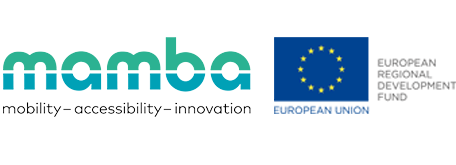13. February 2019
In
news
The MAMBA project partners organised a parallel session on innovative rural mobility solutions in the Nordics at the Nordregio Forum on 29 November 2018. The aim of the session was to provide an overview of current and future trends in innovative rural mobility solutions in the Nordics. The mobility business models that have the biggest potential in rural areas were discussed, together with key opportunities and challenges for rural mobility.
This parallel session drew upon the findings from the MAMBA project, the research results from VTI (the Swedish National Road and Transport Research Institute) and VTT (Technical Research Centre of Finland), and several good practice examples from Sweden, Finland and Denmark.
Anna Berlina, researcher at Nordregio, informed about MAMBA and gave an introductory presentation about rural mobility trends in the Baltic Sea Region and lessons learned from the MAMBA study on socio-cultural factors influencing the choice and adoption of rural mobility solutions (read more here). She concluded that designing effective mobility solutions requires a thorough understanding of key drivers of transport preferences and travel behaviour, as well as considering contextualisation and actor involvement.
Jessica Berg, researcher at the VTI, gave a presentation on the KOMILAND project results. KOMILAND is a project that addressed combined mobility services in rural areas, financed by the Swedish Innovation Agency. The aim of the project was to prepare for future demonstration projects for combined mobility in small towns and rural areas in Sweden by providing data on location, users, services and financing. The project also explored difficulties and opportunities associated with initiating demonstration projects. As a follow-up, a first demonstration project is planned to be implemented in Västra Götaland region in Sweden during 2019. Find more about the results of the KOMILAND project in a short video interview with Jessica here: https://vimeo.com/317026071
Juho Kostiainen, research scientist at the VTT specialised in Intelligent Transport Systems and Services, gave a presentation on rural mobility experiences and activities, focusing on the tourism industry in the Finnish Lapland. Ylläs Around is a mobile application that piloted during ski seasons in Ylläs in 2016-2017. The APP offers trip chain info, guidance and ticketing for public transport and taxis, and offers shared taxi trips heading the same way. Despite a high customer satisfaction level with the APP, it does not tackle the root problems of transport deficiency and waiting times. Among the key lessons learned from this pilot is that there is a ‘need to catch travellers before arrival’ referring to extensive marketing efforts (read more about “Ylläs Around” in the MAMBA case study here). The approach and easier discovery is currently being scaled up in collaboration with other destinations across the Finnish Lapland in a project called Open Arctic MaaS. A new cooperation project funded by Sitra (Finland’s fund for the future) focuses on different ways of organising mobility services in rural areas – and particularly using the existing, limited capacity more efficiently by combining private and publicly subsidized trips (e.g. social and health service transportation), where feasible. During the project, a new cost-effective technology platform that can be modified to serve different needs will be developed for the use of the participating, and other regions in Finland and abroad. The trials are enabled by the new Act on Transport Services and the Mobility as a Service technology (MaaS), in collaboration with public and private actors. Source: Juho Kostiainen, VTT 2018.

Tobias Forngren is CEO of Freelway – a company that offers a combined goods and transport service in rural areas in Sweden. Freelway is a relatively new business, established in 2014 and has several fields of activity. Freelway cooperates with village communities, country shop owners, municipalities, contracted carriers, taxis, the Swedish church etc. by using them as sources of transport in delivery of goods. Freelway has also initiated a ride sharing service in Skattungbyn, promoting the use of shared taxis and private cars. There are also plans to integrate and visualise unused transport resources, provided by local public transport providers, within the Freelway service. Freelway has recently initiated a collaboration among farmers in co-transportation of goods to local shops/restaurants and service places. Tourism will be another field of activity for Freelway from 2019. Freelway has established a cluster that brings together hotels and companies working with destination activities in order for them to share transportation modes. Private companies are also among the key customers of Freelway. The Freelway service allows employees, partners and customers of participating companies to share free seats in booked taxis, rental cars and car pools, as well as encourages ride sharing amongst employees. Read more about Freelway at www.freelway.com.

Søren Sørensen is a smart mobility and MaaS facilitator and a founder of SFMCON. His presentation focused on rural mobility in Denmark based on the examples of Nordjyllands Trafikselskab in Northern Jutland (described in one of the MAMBA case studies, read here) and Fynbus on the island of Fyn. One of his conclusions was that offering the individual last mile pick up/delivery has proven to be successful and highly important for people living in rural Denmark, who do not have access to private means of transport. He stressed that the cost of operating empty bus lines may be better used to subsidize a taxi fare when needed by a citizen far away. He also sees great potential for shared mobility in rural areas in the future. According to Søren, one of the limitations for enabling MaaS in rural settings is that public transport authorities want to have control over public transport solutions and of MaaS, which should not necessarily be the case. A cab fare can be subsidised more or less by the public, based on service levels, geo-position and other rules. An important question to address, however, is how a MaaS solution can deliver all the options to users starting or ending a journey far away from the public transit network. He concluded that customers’ preferences, needs and behaviour should be viewed as drivers for future mobility schemes and not the bus schedules (read more at www.sfmcon.com).




























